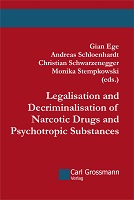Legalisation and Decriminalisation of Narcotic Drugs and Psychotropic Substances
Author(s)
Schloenhardt, Andreas
Contributor(s)
Ege, Gian (editor)
Schwarzenegger, Christian (editor)
Stempkowski, Monika (editor)
Language
English; GermanAbstract
Debates about decriminalising or even legalising certain narcotic drugs and psychotropic substances have gained much momentum in recent years. On the surface, it appears that more and more jurisdictions are exploring the introduction of measures to permit, albeit in very controlled ways, the use of some narcotic drugs, if only for medical purposes. Others further agree that the so-called ‘war on drugs’ has failed to produce any meaningful success and that new ways to prevent the abuse of narcotic drugs and psychotropic substances need to be explored. Nevertheless, most jurisdictions continue to impose near-complete bans on the production, manufacturing, trade, transport, supply, sale, and possession of illicit drugs. National authorities, along with international organisations, point out that any move to decriminalise narcotic drugs and psychotropic substances is inconsistent with international law.
As part of a joint teaching programme on transnational organised crime, students from the Universities of Queensland, Vienna and Zurich researched the topic of illicit drugs in a year-long course. Some of their academic papers are compiled in this volume, addressing topics reaching from international and national legal frameworks to concrete liberalisation efforts in the past and harm minimisation strategies.; Die Debatten über die Entkriminalisierung oder gar Legalisierung bestimmter Suchtstoffe und psychotroper Substanzen haben in den letzten Jahren stark an Dynamik gewonnen. Oberflächlich betrachtet scheinen immer mehr Länder die Einführung von Maßnahmen zu prüfen, die den Konsum einiger Betäubungsmittel - wenn auch in sehr kontrollierter Form - erlauben, und sei es nur für medizinische Zwecke. Andere Experten sind ebenfalls der Meinung, dass der so genannte ""Krieg gegen die Drogen"" keinen nennenswerten Erfolg gebracht hat und dass neue Wege zur Verhinderung des Missbrauchs von Betäubungsmitteln und psychotropen Substanzen erforscht werden müssen. Dennoch gelten in den meisten Ländern nach wie vor nahezu vollständige Verbote für Produktion, Herstellung, Handel, Transport, Lieferung, Verkauf und Besitz illegaler Drogen. Nationale Behörden und internationale Organisationen weisen darauf hin, dass jeder Schritt zur Entkriminalisierung von Betäubungsmitteln und psychotropen Substanzen im Widerspruch zum Völkerrecht steht.
Im Rahmen eines gemeinsamen Lehrprogramms zur grenzüberschreitenden organisierten Kriminalität haben sich Studierende der Universitäten Queensland, Wien und Zürich in einem einjährigen Kurs mit dem Thema illegale Drogen beschäftigt. Einige ihrer aktuellen akademischen Arbeiten sind in diesem Band zusammengestellt. Sie behandeln Themen, die von internationalen und nationalen rechtlichen Rahmenbedingungen über konkrete Liberalisierungsbemühungen in der Vergangenheit bis hin zu Schadensminimierungsstrategien reichen.
Übersetzt mit www.DeepL.com/Translator (kostenlose Version)


 Download
Download Download
Download